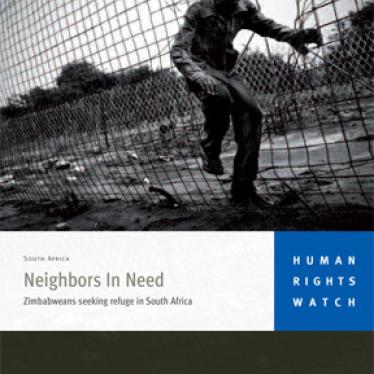"After they whipped and then beat me with an iron bar, I knew I could not continue and had to leave to survive, so I came to South Africa," a woman called Grace told Gerry Simpson, a Human Rights Watch researcher investigating the plight of Zimbabweans in South Africa.
Grace is among the estimated 1.5 million Zimbabweans who fled across the border in recent years as Zimbabwe descended into economic disaster and brutal political violence. Zimbabwe has suffered inflation rates of more than 100,000 percent, an 80 percent unemployment rate, and a cholera epidemic, as well as killings, arrests, and the torture of hundreds of opposition supporters around the 2008 presidential election.
A 43-year-old whose eyes betray the strain of the past, Grace left three years ago when the government bulldozed her home and the homes of 700,000 other people in Harare, the capital, in what it called "Operation Clear the Filth." Grace, her mother, and her daughter lost everything and then faced arrests, fines, and beatings by the police. Finally, Grace and her family escaped to South Africa.
"We found people who had fled a nightmare at home and found anger and rejection in South Africa," said Simpson. "Zimbabweans couldn't get work permits or find places to stay. Many were HIV-positive but had no access to health care. They were living in appalling conditions." Simpson found that, without legal status in South Africa, 5,000 Zimbabweans, including many entitled to refugee status, were being deported back to Zimbabwe every week.
Simpson met Grace in a Methodist church in Johannesburg where she was crammed with 1,300 others. "Hundreds of people, including women and children, were sleeping on stairs, living in terrible, unsanitary conditions, and facing the constant threat of eviction by the local authorities," he said. "Aside from displaying the appalling life faced by these vulnerable people, the church was a symbol for the hundreds of thousands of less visible Zimbabweans fleeing oppression and struggling to survive in South Africa."
Three months later, South African police raided the church and arrested about 800 people. In May 2008, general violence against foreigners and even South Africans in many parts of the country killed at least 62, injured 670 and forced tens of thousands of foreigners to flee South Africa.
It was in this atmosphere that Human Rights Watch released its report, "Neighbors in Need: Zimbabweans Seeking Refuge in South Africa," which urged the authorities to allow Zimbabweans to remain in South Africa as long as their lives and welfare was threatened in Zimbabwe.
It was a turning point.
After Simpson presented an advance copy of the report to the Office of the UN High Commissioner for Refugees (UNHCR), the agency reinforced its call on South Africa to halt deportations back to Zimbabwe. UNHCR also adopted Human Rights Watch's position that Zimbabweans fleeing to South Africa were involuntary economic migrants and that the mass evictions that caused Grace to flee were a valid basis for refugee status. UNHCR agreed to include that position in training its South African personnel, as we had requested.
The South African government opened a new refugee reception office on the border with Zimbabwe in response to Human Rights Watch's call to end unlawful detention and deportation of asylum seekers as they tried to reach refugee reception offices hundreds of miles from the border. The refugee reception office enables Zimbabweans to apply for asylum as soon as they enter South Africa. The huge number of claims registered there since the center opened in July 2008 significantly contributed to the enormous strain on South Africa's asylum system, which in turn encouraged the government to respond to Human Rights Watch's call for comprehensive measures protecting all Zimbabweans in South Africa.
On April 3, 2009, the government of South Africa announced it would hand out "special dispensation permits" to allow Zimbabweans to remain in South Africa legally for six to twelve months. Now, up to 1.5 million people will be free of the fear of violence, arrest, and deportation back to the country they struggled to escape. Grace, and hundreds of thousands like her, will have the right to work, to send their children to school, and to access basic health care.







